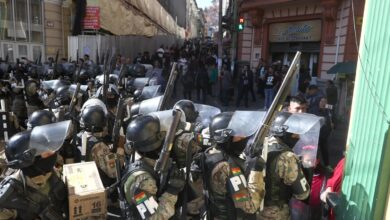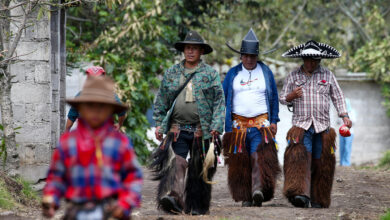Migration in the Ecuador of Guillermo Lasso: what lies beyond ideology?
During the migratory crisis of Ecuadorians that is currently being experienced, a particular debate has arisen between experts and users on social networks: is migration a phenomenon typical of leftist countries or, as demonstrated in the case of the Ecuador of right-wing Guillermo Lasso, can you present yourself in other right-wing countries?

Photo: TW-LassoGuillermo
LatinAmerican Post | Christopher Ramírez
Listen to this article
Leer en español: Migración en el Ecuador de Guillermo Lasso: ¿qué hay más allá de la ideología?
In recent weeks, the Government of Panama, headed by President Laurentino Cortizo, has sent a wake-up call to his equal in Ecuador, Guillermo Lasso, announcing that, contrary to what was observed a few months ago, the flow of Venezuelans that cross through that country to reach the US has decreased, and that now Ecuadorians are the ones who appear the most through its territory.
"Although in the last week the flow of Venezuelans has decreased considerably (…), there are other nationalities that we are seeing are increasing, for example, Haiti and Ecuador, and we are very aware of that," Cortizo reported.
In the specific case of the number of Ecuadorians who have left their country, seeking to cross the Darién Gap (border between Colombia and Panama) and go to North America, the Colombian authorities assure that incredible growth has been evidenced concerning 2021.
"In the first nine months of 2022, 6,698 Ecuadorians have passed through the Darién Gap, a figure much higher than the 387 people who did so in all of 2021," said Colombian Ombudsman Carlos Camargo.
For its part, the Ombudsman of Ecuador also gave its figures in percentage: the exodus of its nationals increased by 1,000% between January and September 2022.
Why Are Ecuadorians Leaving?
Among the great problems that Ecuador is experiencing today, and which for the most part were born or reproduced during the term of Guillermo Lasso, hunger, violence, and insecurity are some of the most important.
In the case of the first, it is worth highlighting a report given by the United Nations Children's Fund (Unicef) in Quito (Ecuadorian capital), in which it indicated that the pandemic left a child food crisis in which Ecuadorians have not been able to get up.
According to this UN entity, 50% of families that have minors in their homes cannot feed themselves adequately, while 80% of indigenous minors do not even have access to services such as aqueducts or sewage.
In addition, 27% of children suffer from chronic malnutrition. This figure increases to 38% in the infants of the native communities of that country.
In terms of violence, there are several riots that this South American country has experienced in recent months, especially due to the onslaught that drug trafficking groups have assumed against the forces of power and that in recent days left a balance of five policemen killed.
According to the BBC, “the Ministry of the Interior and the National Police have registered 145 attacks with explosives in Ecuador between January and August of this year, a record in the country's history. 72 of them, almost half, have occurred in Guayaquil.
This, of course, has also led to a political crisis with Lasso defending that the current situation is a consistent retaliation by drug criminals for the persecution that his government has imposed against these groups, and, on the other hand, with former President Rafael Correa and its assembly members asking for the departure of the president, considering him responsible for “the tragedy” that the country is experiencing today.”
All these situations of public order, as well as poverty and lack of guarantees on the part of the national government, have meant that, in September of this year alone, more than 21,000 Ecuadorians left their country in search of a better future.
Migration: Left Or Right?
Finally, it is important to note that the Ecuadorian reality, amid a right-leaning government, has put, both in the mouths of experts and citizens on social networks, a new conversation: “migration is not a phenomenon only of the left".
As Colombian academic César Rodríguez Garavito explained in one of his columns, political opportunism is what seeks to make a social problem such as migration an opportunity to undermine the agendas of governments in the countries in which it occurs.
For Rodríguez, it is notorious, for example, that in the case of Venezuelan immigrants, the right has tried to use a discriminatory discourse against the left to win supporters for the elections in each territory, and the Venezuelan Executive has done the same. ignoring what at first glance is a reality and victimizing themselves at all times.
"The opportunism has not only been from the Venezuelan government but from the political sectors of the entire region, both on the left and on the right (…) The Venezuelans who had to migrate are victims of a double injustice," he added.
You can also read: Daniel Ortega, the Great Dictator of Nicaragua Increasingly Powerful
Álvaro Vargas Llosa, son of the writer Mario Vargas Llosa, showed a similar thought, from his right-wing position, assured that a phenomenon seen in the mid-20th century, during the period between the wars, is currently being repeated:
“In the 20th century, the right interrupted its free-trade and immigration-prone convictions (especially in the first decades, the statist period between the wars). The left, which was already grumbling against the free movement of things and people, continued on its own, with which both political tribes began to resemble each other. It is not surprising that the extremisms of the left and right ended up merging into fascism (which came, let us not forget, from one of the versions of socialism)”.
Thus, if political opportunism continues and migration moves to a second level, ideologies will dominate over the social problems that trigger the massive departure of people from their places of origin.




